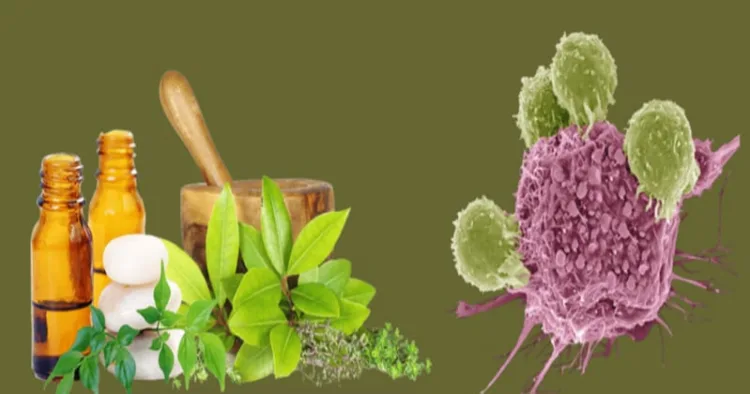An age-old Indian medical system called Ayurveda provides a comprehensive approach to treating cancer that places an emphasis on individualised therapy, herbal treatments, and lifestyle changes.
Ayurvedic methods are becoming more widely acknowledged for their ability to supplement conventional cancer treatments, improve quality of life, and minimise side effects associated with treatment—all without serving as a stand-alone treatment.
Principles Fundamental to Ayurvedic Cancer Treatment:
The following principles inform ayurvedic cancer treatment:
Dosha Balance:
Identifying and bringing the three doshas (Pitta, Kapha, and Vata) into balance will boost immunity, lower inflammation, and promote general well-being.
Detoxification:
Panchakarma treatments help increase the body’s inherent healing processes, remove toxins, and revitalise tissues.
Herbal Remedies:
Adding particular herbs and concoctions with immune-boosting, anti-inflammatory, and antioxidant qualities to traditional treatments.
Dietary Modifications:
Tailored dietary advice to improve nutrition, balance metabolism, and aid in digestion.
Mind-Body Practices:
During treatment, the use of stress-reduction methods, yoga, and meditation to enhance mental clarity, emotional equilibrium, and resilience.
Ayurveda offers a variety of treatments that are believed to support cancer care by addressing overall health, enhancing immunity, and managing symptoms and side effects. Here are some Ayurvedic treatments commonly used in the treatment of cancer:
1. Herbal Formulations:
Ashwagandha (Withania somnifera)-
Known for its adaptogenic qualities, ashwagandha is used to boost immunity, lessen stress, and possibly even stop the growth of tumors.Curcumin, a strong antioxidant and anti-inflammatory substance found in turmeric (Curcuma longa), may help lower inflammation, boost the immune system, and aid in the treatment of cancer.
Tulsi (Holy Basil, Ocimum sanctum)-
Considered an immunomodulator and antioxidant, Tulsi is utilized to minimize oxidative stress, boost detoxification, and improve general well-being during cancer therapy.
2. Panchakarma Therapies:
Abhyanga (Oil Massage)-
Helps stimulate lymphatic circulation, relieve stress, and support detoxification.
Swedana (Herbal Steam Therapy)-
Promotes sweating to remove toxins and enhance circulation.
Medicated enema-
Helps maintain overall detoxification and digestive health by balancing the Vata dosha and cleaning the colon.
3. Dietary Modifications:
Personalised Diet Plans-
Customised diet regimens that emphasise fresh produce, whole grains, lean meats, and particular herbs and spices with anti-cancer qualities based on a person’s dosha constitution and type of cancer.
Fasting Therapies-
To improve detoxification and promote metabolic health, periodic fasting or altered fasting protocols may be suggested.
4. Lifestyle Recommendations
Yoga and Pranayama (Breathing Exercises)-
Help lower stress, increase circulation, and support general health
Mindfulness and Meditation Practice-
Encourage emotional equilibrium, lower anxiety, and strengthen resilience while undergoing cancer treatment.
5. Specific Herbal Preparations:
Triphala-
A combination of three fruits (Amalaki, Bibhitaki, and Haritaki) that are said to have revitalising and cleansing qualities, promoting digestive health and general vitality.
Guduchi (Tinospora cordifolia)-
Functions as an antioxidant and immunomodulator, promoting general health and immunological function.
6. Ayurvedic Therapies:
Chyawanprash-
A revitalising herbal jam that boosts immunity, increases vitality, and promotes general health.
Notably, Ayurvedic cancer treatments are frequently employed in addition to traditional medical treatments as supplemental therapy. To guarantee safety, efficacy, and appropriate integration with conventional cancer care procedures, individualised treatment regimens should be devised in cooperation with experienced Ayurvedic practitioners and hospitals.
With an emphasis on individualised therapy, natural treatments, and lifestyle changes, ayurvedic methods to cancer treatment provide a way to complement conventional care. Ayurveda supports patients on their journey toward recovery and well-being by addressing the physical, emotional, and spiritual aspects of healing. This holistic approach to cancer therapy is becoming more and more popular as interest in integrative oncology develops.



















Comments